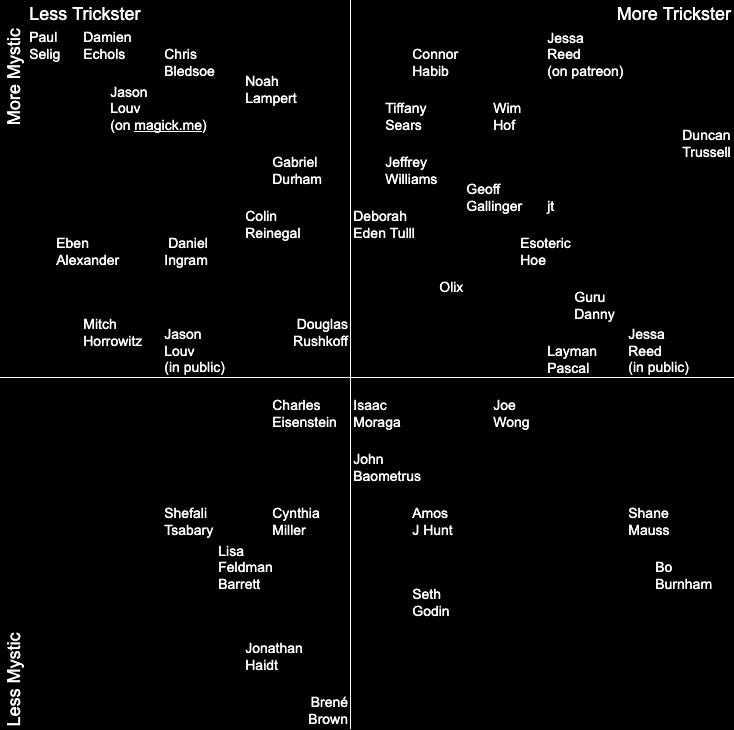Note: This essay is the closest thing to a magnum opus I’ve ever written, and as such, it’s just a bit too long for email. Go to Creekmasons.com to read (or listen to) the full thing before you get most of the way through and end up unceremoniously cut off.
“I settled on the name Liminal because one definition of the word is ‘to occupy a position at, or on both sides of, a boundary or threshold’ which for me speaks perfectly to the idea that everyone in the space is in their own unique way attempting to midwife a new kind of regenerative culture whilst simultaneously hospicing the old.” - Joe Lightfoot
“Humor can be deeply subversive – not only by making authorities seem ridiculous, but by making light of the reality they attempt to impose.” - Charles Eisenstein
“The metatribe is scientific without scientism. It is spiritual while being neither new age nor traditionally religious.” - Tyler Alterman
“I hope the magicians that do tricks for zoo monkeys know that the monkeys usually go insane and have to be euthanized.” - Duncan Trussell
Another Label? But Why?
The project of shoehorning the natural world’s spectrums and networks into a taxonomy of discrete, referential language doesn’t even vibe with the disposition of the thinkers, artists and scientists listed above, or that of their audiences… So why do it?
Because there’s power in a name. A thing that can be named can be manifested. An egregore with a name becomes more influential. A subculture that is aware it exists can proselytize.
And, maybe narcissistically, I feel strongly that the world would benefit from Liminal Trickster Mystics.
My intuition is that there are a lot of us waking up right now or finally being honest about how we’ve always felt—a little off and outsidery. My raison d’être with the Creekmasons generally, and this essay in particular is to facilitate all of us coming together within the media sphere where our wackiness is authentically, aspirationally represented.
Wondering whether you belong? Let me break it down for you. What follows are the core traits of a Liminal Trickster Mystic (LTM). If he had visited the archipelago of books, Discord communities and podcast episodes that forms this subculture’s Galapagos, Darwin would have sketched out these traits in his journal.
As an expression of our liminality, we prioritize self-expression, we are polygnostic, and we support the translation of apocalypse as “unveiling.”
To qualify as trickster, to varying degrees, we express a love of embracing taboo, making self-deprecating jokes, and abhorring hierarchy. Like many history’s tricksters, we are often anarchists.
And although some are more mystical than others, almost all of us share tolerance, if not respect, if not an obsession with the power of myth, (being near to but not belonging to) the New Age movement, and magick and mind causality.
Put another way, we don’t belong on any side of any polarity, we don’t take anything too seriously, and we look for meaning in everything.
And for the home crowd, let’s relate this back to the creek from which the Creekmasons get our name:
We feel best inhabiting the liminal places, like suburban creeks full of pseudo nature.
True tricksters, we playfully mock the mores of sober, domesticated, cultural wastelands, experimenting with psychedelics and radical philosophy.
And with the help of that chemical experimentation, we mystically co-create meaning by weaving stories from inferences deduced via examination of artifacts left behind by the people we share our spot with.
Liminal
Joe Lightfoot deserves a share of credit for this essay. You may recognize the single rhetorical act with which he birthed the Liminal Web as my obvious inspiration, but I’m hoping to convey more of a reverent homage than some kind of poseur plagiarism. Although he coined the Liminal Web, the similarities between the specific cluster of thought-leaders that I’ve listed here haven’t, to my knowledge, been identified.
And it is “identified,” not “invented.” As with Lightfoot’s thesis, mine rests on this subculture being an emergent phenomenon.
Lightfoot’s reason for picking the word “Liminal” begins this article—a very “metamodern sensemaker” disposition toward hospicing Game A and midwifing Game B. The word liminal resonated with me much more deeply, though, even when I first encountered his essay.
Even LTM fans exhibit the very liminal quality of mediating from the middle of the political divide. Possibly, it’s partially motivated by conflict avoidant personalities, but it’s still ostensibly virtuous. There is an ever-present emphasis on respect, compassion and the inefficacy of shame in LTM circles.
We appreciate that everything is on a spectrum and feel comfortable inhabiting the space between poles.
Furthermore, as I’ve discussed elsewhere, I find credulity mildly repulsive. It’s like stepping in dogshit to encounter absolute certainty—allegiance to blue or red, science or magick, vaccination or not, Atheism or God, etc. It’s tiring. It lacks nuance. Restricting yourself to one side of an argument—and often inventing a monolith for the Other—can’t accurately contain reality’s deluge of gray area.
So, what to do if dogshit dogmatism’s got you down? Rinse the stink off your sole with your smartphone thumb intensifying the garden hose of liminality!
What makes an LTM Liminal? They are…
Self-Expression Prioritizing
Duncan Trussell, best known for the Duncan Trussell Family Hour podcast that supplied audio for the mind-blowing Midnight Gospel Netflix series, is more or less the prototype for the archetype. In the utterly arbitrary—but hopefully illustrative—coordinate system above, my gut ranking for Trussell has him as the most mystical trickster and the most trickstery mystic.
Months ago, he said something to a livestream of gathered fans along the lines of, “Yeah, I think we’re a subculture, but we don’t really have an aesthetic, do we?”
Of course we don’t. As another LTM, Mitch Horowitz, points out in the book, Daydream Believer, self-expression is one of the highest values to protect. After all, if we each do “what is [authentically] ours to do” as quintessential LTM Charles Eisenstein says, we’ll heal this profoundly sick society.
Like immune system cells that know how to collaborate while also staying in their own lane, LTMs recognize that what is vital to me might not be vital to thee, though we should definitely do both.
They are liminal through this rejection of the culture’s drive to erect, participate in and project monoliths of partisanship and polarization.
Can you imagine a white blood cell spewing hate toward a red blood cell because the latter is focused on coagulation and ignoring the body’s need for fighting infection? Why do we accept it when a person barfs vitriol into a comments section on an article about the bigotry crisis when the Climate Crisis is “obviously more urgent?”
LTMs know the “Crisis Crisis” demands that we learn from each other, synthesize information from disparate sources and work together, but also that we unashamedly apply our influence where it is most welcome, effective, and naturally inclined to be directed.
They tend not to proselytize for a team because they’re happy we’re all unique.
By the way, I’ll happily grant the irony inherent in writing that here, in an essay that acts as a stab at self-definition aiming to attract others to the LTM team. Can it be justified? Well, here’s my thought: being on Team Liminal is a little like being on all teams at once and choosing, situation by situation, to present the side of yourself to the world that most effectively suits your objectives.
Polygnostic
Douglas Rushkoff is another true liminal. In one of his Team Human podcast episodes, he told the story of describing the famous discordian, Robert Anton Wilson, as “believing in nothing.” RAW insisted that wasn’t quite right. It was more accurate to say he believed everything simultaneously.
LTMs share RAW’s philosophy. As far as I know, I’m the one to have coined “polygnosticism:” poly- meaning many, and -gnosis, meaning knowing or better yet, grokking. LTMs believe everything at once; what comes through moment by moment depends mostly on what is appropriate, effective and beneficial to all involved.
It’s a kind of William James-esque philosophical pragmatism that is married with that apocryphally Aristotelian quote: “It is the mark of an educated mind that they can entertain an idea without accepting it.”
When confronted with conflict, LTMs don’t aggressively attempt to out-masculine their opponents with shame or a dunking; they begin by agreeing wherever alignment exists, then interpolate additional narrative or data into the argument that provokes doubt or a critical reframe.
They’ll use “both/and” sentence construction that finds value in apparently contradictory clauses.
LTMs are wont to embrace paradox.
Purveyors of “Apocalypse as an Unveiling”
One of my favorite acid tests is to travel back in time whenever I discover a new podcast or thinker to whatever content they were putting out during March and April of 2020. How did they frame the apparent apocalypse we were living through?
For every one of the twenty-one LTMs I rattled off the top of my head for the chart above, if I was successful in performing this exercise, I was struck by the similarity of their approaches. Each one framed the crises of 2020 via some variant of reference to the Greek etymology of apocalypse, which is roughly “to lift the veil.” Importantly, while other subcultures may have noted similar observations, many of these LTMs heralded the unveiling with optimism, not fear, outrage or despair. To them, the suddenly crumbling faux-stability of civilization’s extraction-based forever-growth model felt a little like kicking off a too-tight shoe.
Again, as Lightfoot said, they each have “their own unique way attempting to midwife a new kind of regenerative culture whilst simultaneously hospicing the old.”
Although it’s unlikely that LTM’s on the less mystical side of the spectrum would be entirely convinced by medium Paul Selig’s conversations with his incorporeal Guides, many of them would still support one of the Guides’ primary messages: as a civilization, we are in the midst of addressing a collective shadow that has been ignored for too long.
I find myself recounting the metaphor that the Guides use often; it’s a comforting perspective on our Interesting Times.
As a species, they say, we are currently engaged in excavation. There are skeletons buried in our backyard which we intend to extract, but first we have to dig up everything we’ve hidden underground. So right now, our space is in a chaotic tumult, dirt everywhere. It’s not pretty, but it is necessary to get the skeletons out and begin the project of planting something beautiful and fragrant in the reclaimed and renovated space.
Trickster
Many LTMs, like Jessa Reed and Duncan Trussell, are comedians who have undergone some kind of spiritual awakening. Others, like Shefali Tsabary and Brene Brown, are serious thinkers who recognize that storytelling—and humor—is the most effective route toward changing minds.
Maybe this is a Neil Postman thing: everyone has to be an entertainer now because TV has radically disrupted our expectations of public intellectuals just as much as it’s disrupted everything else… But LTMs elevate prioritizing entertainment to a moral good by recognizing the role that humor can play in dispelling taboo, oppression and the overwrought seriousness of partisanship.
Taboo Embracing
I know this will be a controversial point.
A point difficult to apply equally to every LTM I’ve listed, much less every LTM who will read this article. I think it's true though: most members of this subculture are oriented toward earnest attempts to be respectful toward identity politics, but not entirely convinced that wokeness consistently clears the hurdle of being gestural equality that Power is happy to placate in favor of real equality.
If the Pentagon is out here flying rainbow flags for Pride month, there must not be much danger to the established systems of oppression, exploitation and extraction that the alphabet soup of American intelligence agencies is sworn to preserve.
So some LTMs will sometimes step on propriety. Most are progressive in some sense, but many are willing to embrace topics taboo to the Left. They’ll even platform people with their podcasts who cling to language circling atavism’s drain who uphold what might be considered, charitably, “traditional Western values.”
But like a Hatha Yoga flow, for every stretch there is a counter-stretch.
For every taboo broken, there is an opportunity to cultivate silence, hold up the mic and compassionately listen to a historically disadvantaged person’s lived experience.
Some White Male LTMs may even feel called to step aside and let another demographic take the lead. Maybe being groomed by a colonist, supremacist patriarchy to be Burdened with a savior complex ought to disqualify one from architecting the next—more beautiful—world.
But white fragility merits an essay of its own. For now, it’s best to leave it at this: despite being unconvinced by the revolutionary oomph of Identity Politics, the liminal approach is to avoid going too far in the other direction and ignorantly proclaiming diction isn’t causative. Proclaiming erroneously that it isn’t, let’s just say it, Magick.
Self-Deprecating
Despite what I’ve just implied about the LTM relationship with White Male Fragility, very few LTMs fit neatly into the cultural stereotypes of leaders.
They tend to have some kind of outsider identity.
Yes, although they might be underrepresented, many LTMs are women and POC, but the ones who aren’t were bullied, religious minorities, mentally ill, chronically ill. Something innate tends to incline them toward Othered ideological outlooks.
You know because they’ll tell you. LTMs are famously self-deprecating.
Their Trickster nature doesn’t allow them to even hold their own ego as something sacred that can’t be mocked. The public persona of an LTM is vulnerable and imperfect. They’ll confess to challenges. They’ll own up to character flaws.
Truthfully, they each have the recipe to embody the unscrupulous Guru archetype: a touch of the mystical, a scoop of the political, and a healthy measure of razor-sharp wit.
Occasionally, I wish they’d take a match to the stove and stir fry those ingredients—along with their missing arrogance—to actualize their ideals and change the world.
But their reluctance is part of why I love them.
Anarchist
I’d argue you can’t be a guru and an anarchist. Why? Well before we continue, anarchists have ceded their public image’s definition to their political opponents, so you can’t be blamed if the designation calls to mind violent, careless, callous chaos beings.
But hold off on recoiling from anarchy and consider what the word really means because, as David Graeber says, “Are You An Anarchist? The Answer May Surprise You.” Here’s some self-evaluation questions cribbed from that essay that will give you a good idea of true anarchist values.
If there’s a line to get on a crowded bus, do you wait your turn and refrain from elbowing your way past others even in the absence of police?
Are you a member of a club or sports team or any other voluntary organization where decisions are not imposed by one leader but made on the basis of general consent?
Do you believe that most politicians are selfish, egotistical swine who don’t really care about the public interest? Do you think we live in an economic system which is stupid and unfair?
Do you really believe those things you tell your children (or that your parents told you)? For example, “It doesn’t matter who started it.” “Two wrongs don’t make a right.” “Clean up your own mess.” “Do unto others...” “Don’t be mean to people just because they’re different.”
Do you believe that human beings are fundamentally corrupt and evil, or that certain sorts of people (women, people of color, ordinary folk who are not rich or highly educated) are inferior specimens, destined to be ruled by their betters?
Note: the right answer to this one is No.
The Guy Fawkes mask-clad vigilante in Alan Moore’s V for Vendetta inspired a lot of people during Occupy Wall Street—and in more ways than choice of headwear. The trickstery anarchist organizations that provide Mutual Aid to this day encourage laughter and rebellion in the face of authority; light-hearted, revolutionary and sincere.
LTMs tend to be accepting of any political affiliation, apart from fascism, but you definitely get bonus points for being an anarchist.
Mystic
Similar to my uncertainty regarding the true popularity of Jungian archetypes, I am also never sure whether there is a mass awakening happening, or whether my algorithmically curated filter bubble is giving me the false perception that I’m not alone in my insanity.
Jiddu Krishnamurti’s assertion that “It is no measure of health to be well adjusted to a profoundly sick society” will undoubtedly be familiar to many LTMs, however. If we are insane for being a little off-kilter and outside the mainstream, many of us wear the badge of a diagnosis with pride. I’ve fought a personal crusade to destigmatize mental illness through frequent and casual disclosure, going so far as to “out” myself as Bipolar into a mic during a company All-Hands at a previous employer.
Why talk so much about mental illness when approaching the topic of LTM’s appreciation of mysticism? It comes down to a different quote, this one from Joseph Campbell: “The psychotic drowns in the same waters in which the mystic swims with delight.”
Many of us have experienced the frantic flailing to keep our heads above the surface that accompanies what the Woo community calls an awakening. Many of us have also been accused of swimming with delight in strange waters, courageously exploring ideas that challenge or outright contradict a default narrative.
Put more simply, LTMs qualify as mystics because we often feel drawn to meditation, contemplation, or other spiritual practices in service of our search for a deep, intuitive understanding of the universe. We tend to be undaunted when that understanding starts to wobble away from the worldview of our square coworkers and neighbors.
Myth Appreciating
Most fundamentally, the Mysticism of the LTM mindset shows respect for mythology's significance.
The LTM movement is adjacent to the sensemaking milleiu, and can compete for—or at least make a good case to share—the moniker of metamodernism. As such, many LTMs are interested in awakening from the Meaning Crisis that we find ourselves in as the colonialist, supremacist patriarchy we didn’t ask to inherit crumbles around us.
It’s a little like a huddle around a campfire. We’re snug together against the winds of change, scooching close for warmth and compassion as the myths collapse that granted civilization its coherence and justified a privileged place in it for the largely white and male LTMs.
Unlike some more reactionary public intellectuals, LTMs tend to consider it a plus on the whole that the dominator mindset is finally imploding. That collection of narratives has promoted deforestation, mass extinction, prairie destruction, wetland shrinking, parking lot construction, and countless other profanities disgracing our planet.
But what comes next? As we sit around the campfire, what stories are we telling? Will we reclaim old myths and indigenous wisdom? Can we hope to adopt the more prosocial and pro-ecological dispositions those older stories engender? It’s an attractive option.
After all, LTMs know that you can only act in the sphere in which you imagine action is possible and that that sphere is delineated by myth.
Self-Consciously Not New Age
With the notable exception of Mitch Horrowitz, who embraces the New Age moniker proudly, LTMs often self-consciously insist they should not be lumped in with that fluffy-headed movement. However, they can still sometimes be similarly vulnerable to accusations of cultural appropriation.
It might be a fair criticism. You kind of need a colonialist attitude to excuse this ubiquitous orientation toward synthesis of the world’s wisdom traditions into a Perennial Philosophy. LTMs tend to sample chaotically from the buffet of religiosity, picking up whatever feels authentic and energizing to them in particular and leaving behind what they view as unimportant or morally atavistic.
Remember the love of authentic anarchy and the emphasis on self-expression that are espoused by LTMs? This eclectic, Chaote, Amalgamator approach to spirituality is another manifestation of that same prioritization of self-determination.
I struggle with whether it’s arrogant to presume we’re welcome in these traditions, but surely the adherents to any ideology that promises enlightenment would be excited by the prospect of more people becoming enlightened, right?
As a result, almost all LTMs are interested in or practicing some form of meditation. Whether it’s Visualization, Vipassana, Pranayama, Hoffing, Transcendental Meditation, Mindfulness, or Kirtan doesn’t really matter. The only overarching rule is general interest in mysticism and a rejection of the dogmatism expressed by the nihilist scientific materialists who prop up Default Reality.
Magick and Mind Causality
Just like the Liminal and the Trickster sections, the qualities in the Mystic section are ordered from less-to-more as well. This is important to point out, because there are absolutely some thinkers who I’ve identified as LTMs in the lower half of the chart above who might consider Aleister Crowley-style magick and occultism frivolous superstition.
However…
Too many LTMs take Conner Habib’s stance regarding magick—that it is real, but can often be explained using language that bridges the Woo and scientific materialist divide—for this article to ignore.
LTMs like Jessa Reed and Jason Louv are especially adept at this translation particularly when embodying their most widely-distributed-media personas. As I’ve arbitrarily depicted in the chart above, they adroitly calibrate their Woo levels to be appropriate to the audience. They both drop hints about the magick and mind metaphysics that they’re into on more mainstream podcasts, but in Reed’s language they come across as self-mocking jokes, and in Louv’s, they take the form of innocuous winks. For example, on Rushkoff’s Team Human, Louv quipped something to the effect of, “If confirmation bias ensures that you’ll only see what your subconscious is looking for, why not use occult techniques to program your subconscious to see what you actually want it to?”
After all that, I still ask myself the question: why would anyone self-identify as a Liminal Trickster Mystic?
Why write at all?
“As it is said, the Dao that can be named is not the true Dao. It is similarly difficult to pin down, define, or write about liminal spaces, mystics, and thinking. That's part of what liminal means. Once we define it, it's not liminal anymore."
I got that note from Node, Creekmason, and definite LTM, John Baometrus when I shared this essay with the Creekmasons. He's got a point. To “define" is to “make finite” and a trickstery feature of the liminality this essay endeavors to pin down is that it's more of a shifting range on a fractal spectrum than a finite point.
So why bother?
Because I’ve always felt alone.
“From day one it was like society was this violent, complicated dance and everybody had taken lessons but me. Knocked to the floor again and again, climbing to my feet each time, bloody and humiliated. Always met with disapproving faces, waiting for me to leave so I’d stop fucking up the party. They wanted to push me outside, where the freaks huddled in the cold. Out there with the misfits, the broken, glazed-eye types who can only watch as the normals enjoy their shiny new cars and careers and marriages and vacations with the kids.” - David Wong (Jason Pargin), John Dies at the End
You caught me.
This whole essay—this whole attempt at social movement evocation—was just a smokescreen. I named a nascent subculture because I want to find my people. I’m inviting you, reader, to identify with this clique so that we can hang out and build something better, together.
Isn’t “connection” why pretty much everyone does anything?
Reader! Does this seem pitiable? Or did you also feel a little apart from zeitgeist after zeitgeist? Have you nuzzled your exotic, utopian ideals, feeling love for the world that you suspected might always remain unrequited?
Do you enjoy the content of one or more Liminal Trickster Mystic?
Seek out the others.
Through more of us consuming content in this ecosystem and leaving links in our cookies- and cache-based data exhaust, the recommendation algorithms that govern and curate everyone’s online experiences will identify a new identity it can expose to those chilling on its periphery. The lonely tricksters and solitary mystics in whom it is so easy to see ourselves… they need saving. The world needs saving.
Help proliferate an identity that promotes the ideals of self-determination, individual agency, spiritual inquiry, challenging fascism, having a laugh and, yes, saving the world.
Be as self-deprecating as you want; you’ve got to admit those are good goals.
Known Liminal Trickster Mystic Substacks
Alphabetical. If you believe you should be included here (or want to be removed), please let me know via Substack DM!
Unabridged Link Directory
Alphabetical. If you believe you should be included here (or want to be removed), please let me know via Substack DM!

















Luminous Darkness was amazing. I could hardly believe how lucky I was to get to talk with Eden.
And you’re still very welcome here even if you’re too liminal (uncommitted to a category) to be a liminal trickster mystic, lol. I love your stuff!
I have to comment through the article I’m reading.
Dr. Carl Jung mentioned the shadow that humanity was gonna have to face.
Also the present place of Pluto, in it position is going to extract all the BS and lay it out on the table.
Which is predicted to be painful as we noticed for some if not a lot